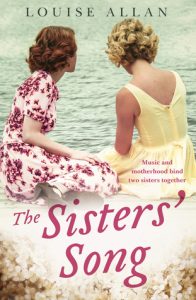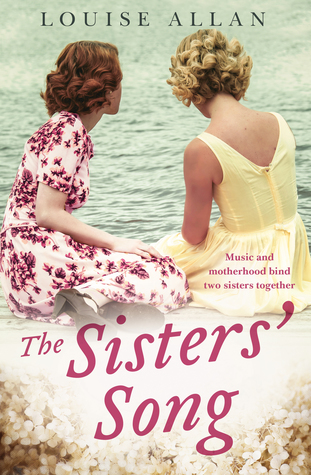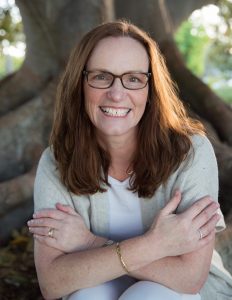Today we welcome Louise Allan to Sunday Spotlight. Her debut novel, The Sisters’ Song, was released by Allen and Unwin on January 2nd.
When did you start writing and what was the catalyst?
I started writing in 2010, at the age of 43 and after working as a doctor for 16 years. With four children reaching their teenage years, life was becoming too hectic. I searched for something else that could replace my job, something I’d enjoy and find stimulating but that could fit within school hours. I chose creative writing, not that I’d written anything but doctor’s letters since high school. By the second assignment, I knew it was what I wanted to do.
How long on average does it take you to write a novel?
I’ve only written one novel and it’s taken me six years to get to publication—and that’s not counting the short story I wrote in 2010 from which it came. I’d have written my novel faster except that I had no idea what I was doing and made so many mistakes. I had to rewrite, and rewrite, and rewrite. So. Many. Times.
I’m hoping all I’ve learnt in writing Novel #1 will make writing Novel #2 easier and quicker. Except I keep getting distracted …
How far has your writing career evolved from when you first began to write to what it is today? Is this in line with your initial expectations?
My writing career has exceeded my expectations by light years! Ten years ago, I had no idea I’d be a writer today—I hadn’t written creatively since high school. When I started writing seven years ago, I had no idea I’d write a novel, and, when I did write one, I never expected it would one day be published, let alone published by Allen and Unwin.
Although I never expected any of this, I did secretly dream and hope for it. I lay in bed at night imagining it, and when I sat and wrote, this is what I was working towards. With all my heart.
What inspired your most recent novel?
The initial inspiration for my novel was my experience of motherhood as a daughter and as a mother, so I drew from my memories of events and stories, as well as my emotional memory.
My two grandmothers were the inspiration for the two main characters in my novel. My paternal grandmother, on whom I’ve based Ida, was a good-natured person. She was humble, gentle and generous. She had a great sense of humour, and she was devoted to us, her family. Her experience of three stillbirths before giving birth to my uncle and father by caesarean was another inspiration I used in my story.
By contrast, my maternal grandmother was grumpy and strict, and, as children, we didn’t like her much. I must say, she didn’t seem to enjoy us either. The stories I heard about the harsh way she treated her own children were the inspiration for the character of Nora.
I dedicated my novel to my paternal grandmother, who was an ordinary woman, like Ida, who was never rewarded for all the good she did. She didn’t do anything extraordinary for which she was recognised, but she showed courage in the face of hardship and grief, and lived an unselfish life being kind to others. By doing that, she made a difference to my life and the lives of everyone around her. I felt that if I didn’t write about her, once my generation passed on, no one would know anything about her. There have been countless good-but-ordinary people who’ve passed through this world, who’ve raised families and lived brave, unselfish lives, but nothing about them has been recorded, and I didn’t want that to happen to my grandmother.
How would you best describe this novel to a new reader?
This novel is about two sisters, Ida and Nora, who are polar opposites in what they want in life: Nora dreams of a life on the stage, while Ida dreams of motherhood. Neither sister is granted her dream—Nora getting pregnant, and Ida having three stillbirths. The story’s about motherhood, children and women’s dreams, with the thread of music woven through it.
How much research do you do? How do you balance the demands of getting the facts right and telling a good story?
I wanted to immerse myself in the setting and era in which my book was set, so I did a lot of research. I loved it, too! I was completely sucked down the internet rabbit warren—I found whole websites devoted to Dame Nellie Melba, and I listened to her recordings, playing them as I wrote some of the scenes in my novel. I watched countless videos, too—on Tasmanian life in the 1950s, on old sawmilling practices, on how to make felt hats, and old teaching movies on midwifery and childcare.
It would be impossible to count the number of the newspaper articles I read on Trove—articles about the buildings in Launceston during the time my novel is set, rationing during the war, the results of the vocal section of the Launceston Eisteddfods in the 1930s, and train trips to the northeast of Tasmania.
Knowing that I wanted to write a novel, in 2010 I interviewed my maternal grandmother, asking her about life in the bush as the wife of a sawmiller. She was 88-years-old at the time and passed away less than two years later.
I read a lot of books, too—on the history of Tasmania and its native flora and fauna, and on the history of psychiatry in Launceston. I read old texts on gardening and millinery, too.
To fit my story, I had to alter a few facts. For example, my main character has a surgical procedure in the early 1940s that wasn’t done routinely until the mid-1950s. One character attended a concert by Dame Nellie Melba in Hobart in 1903, but, although Dame Nellie went to Hobart in 1903, she didn’t perform there. I noted these discrepancies at the end of the book.
How much planning do you do? Do you plan/plot the entire story from beginning to end, or let it evolve naturally as the writing progresses? In terms of characters, are they already a firm picture in your mind before you start writing or do they develop a personality of their own as the story progresses?
I don’t plan at all. Having said that, I waste a lot of words, because I’m prepared to go off on tangents and down rabbit holes. Sometimes, I come up with nothing, but more often than not, I find gold.
I must admit that I find it hard to write when I don’t know who the characters really are or what my story will be about. With The Sisters’ Song, I started writing in the voice of one of the characters—I wrote 50,000 stale words before canning them and starting again. I then wrote 35,000 words in another voice. These were slightly better, but it wasn’t until this second POV character sat down with her Aunt Ida that the story really took off. Once Ida started talking, I knew I’d found the heart of the story and voice I needed to tell it: Ida’s.
What do you like to do when you’re not writing?
When not writing, I like to do housework. Haha! Of course I don’t. I hate housework.
When I’m not writing, I walk the dogs or take photos. I also enjoy reading and making things, and lately, I’m thoroughly enjoying a daily yoga practice.
What is your favourite childhood book? Did reading as a child have any bearing on your decision to become a writer?
My favourite childhood book would be ‘Storm Boy’—I howled at the ending and still do. I’ve read it to each of my kids, and I barely made it to the end without my voice cracking, but it didn’t move a single one of my kids to tears.
I don’t think my childhood reading had any bearing on my decision to write, as I always thought of writers as people who were English or American, and whose words flowed flawlessly onto the page. They did magical things with words that I couldn’t do. It wasn’t until I decided to try and learn to be one of those people, that I discovered such writers are mythical beings and don’t exist.
Do you have an all-time favourite book? Why is this book so significant to you?
My all-time favourite book would be Kazuo Ishiguro’s, The Remains of the Day. It’s not only a story about the English aristocracy during the war and the post-war changes in English society, but it also tells a very human story of a man so loyal and obedient that he’s unable to show his feelings. As a reader, that’s the story that moved me, and, I believe it’s as close to the perfect novel as it is possible to get. As much as I would have liked a different ending, there was no other way this story could end.
If you could write a letter to your teenage self, what would be your main piece of advice?
My main piece of advice would be to trust myself more and not to listen to anyone who told me I wasn’t a good at something I enjoyed.
At school, I paid attention to my less-than-stellar marks in English and stuck with subjects in which I got good marks, Maths and Science. There was a lot more going on in my life at the time, too, which caused me to limit myself to these subjects—the marks weren’t as subjective, and in solving maths equations, I didn’t have to reveal anything of myself.
Having watched my kids go through school, seeing their talents and knowing them as I do, I now realise that marks at school and teachers’ opinions are often wrong and are no indication whatsoever of success or otherwise in later life. Sometimes, I feel annoyed and sad at the twenty-five years during which I didn’t write a single creative sentence because I didn’t think I was any good at it.
Where do you draw your inspiration from? How do you fill up that creativity well?
I draw inspiration from nature and from the arts. Every now and then, I have to swim in an ocean, dive into a wave, taste salt on my lips and feel sand between my toes. That’s how I replenish my creativity well.
I love the arts, too. Music, painting and reading a good book. I enjoy being with other creative people—writers, musicians, artists. We all think along the same lines, and talking with like-minded people is restorative. I get bored very quickly with talk of business or money, or renovations or holidays.
How has being Australian AND a woman impacted on your writing and/or writing career?
I love the ocean, the bush, the freedom that comes with an Australian lifestyle. I’m descended convicts and sometimes I wonder if that’s why I’m rebellious in nature—I hate restrictions and I hate feeling restricted.
Generally speaking, I’ve never let my gender stop me from doing what I want. I don’t believe being a woman has impacted on my writing career, but it did on my medical one. When my children were younger, I found it hard to get part-time work in a public hospital. Twice and in two different states, I was offered part-time positions without pay. I was quite offended, and, after I declined one of the positions, I was told (by a female) that if I really wanted to complete my training I would have accepted it.
I don’t believe being female has impacted on my writing career, although it’s certainly affected what I write about! A major theme of my book is women’s dreams and motherhood, acknowledging that not every woman wants to be a mother. I’ve certainly felt the push and pull of motherhood—on one hand, I longed to have a family and I wanted to be with my babies when they came. At the same time, I resented that my work and career was affected by my growing family and my husband’s wasn’t.
About Louise Allan:
Louise’s first novel, ‘The Sisters’ Song’, is out now with Allen and Unwin. The manuscript has previously been shortlisted for the 2014 City of Fremantle—TAG Hungerford Award and awarded a Varuna Residential Fellowship.
Louise grew up in Tasmania, Australia, but now lives in Perth, Western Australia. Her first career was as a doctor, but in 2010 she ceased practising medicine and took up writing. She has had several short stories, essays and articles published in literary anthologies and medical journals.
Apart from writing, Louise also enjoys music, photography, walking and nature.
Get in touch with Louise at:
About THE SISTERS’ SONG:
 Set in rural Tasmania from the 1920s to the 1990s, The Sisters’ Song traces the lives of two very different sisters. One for whom giving and loving are her most natural qualities and the other who cannot forgive and forget.
Set in rural Tasmania from the 1920s to the 1990s, The Sisters’ Song traces the lives of two very different sisters. One for whom giving and loving are her most natural qualities and the other who cannot forgive and forget.
As children, Ida loves looking after her younger sister, Nora, but when their beloved father dies in 1926, everything changes. The two girls move in with their grandmother who is particularly encouraging of Nora’s musical talent. Nora eventually follows her dream of a brilliant musical career, while Ida takes a job as a nanny and their lives become quite separate.
The two sisters are reunited as Nora’s life takes an unwelcome direction and she finds herself, embittered and resentful, isolated in the Tasmanian bush with a husband and children.
Ida longs passionately for a family and when she marries Len, a reliable and good man, she hopes to soon become a mother. Over time, it becomes clear that this is never likely to happen. In Ida’s eyes, it seems that Nora possesses everything in life that could possibly matter yet she values none of it.
Over a span of seventy years, the strengths and flaws of motherhood are revealed through the mercurial relationship of these two very different sisters. ‘The Sisters’ Song’ speaks of dreams, children and family, all entwined with a musical thread that binds them together.







I am very much looking forward to reading ‘The Sisters’ Song’. Love this insight into the writer’s life. And I think I am a fan of Louise Allan’s sense of humour . . . housework! ha!
Sounds like a wonderful story. I enjoyed your journey of “getting there” to become a writer.